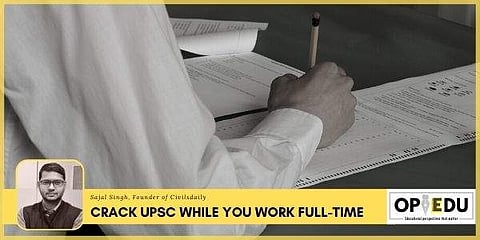

UPSC is not only one of the toughest exams in the world, but one of the longest as well. An exam that is a year-long needs preparation of at least 2 years to clear it. Hence, UPSC aspirants who are working professionals find it difficult to manage their time and complete the vast syllabus.
Some of us have family responsibilities that cannot be neglected. You might be the only earning member of your family. Despite all this, is it impossible to juggle preparation for UPSC and the pressures of work? Not at all. It might be challenging, but it’s an achievable ambition. All aspirants get only 24 hours in a day, so how they spend every hour determines their final result. You have to cultivate the discipline to study every day, whether it’s a good day or a bad day at work. You either run the day or the day runs you.
Does this mean there will be no scope for rest as a Working Junta? Don’t be surprised if we tell you that toppers like Srishti Jayant Deshmukh (AIR 5, 2018) and Roman Saini (AIR 18, 2013) found time to take breaks in between their college studies (Engineering and Medical, respectively) and UPSC preparation! While Srishti took a 5-minute break after every 30 minutes, Roman took a 10-minute break after every 1 hour.
Every topper has their own time management technique. As a working aspirant, it's about time you learnt them:
Opt for a company with fixed timings
It’s better to work in a company with five working days and a fixed duration of eight to nine hours. This allows you to study for six hours every day, from Monday to Friday, and about ten hours on weekends. Do this for a year and you can complete the vast syllabus.
Divide your study schedule into slots
Toppers like Shahenshah IPS, Saurabh Bhuwania IAS and Pujya Priyadarshini IAS have always divided their time into 'before work' and 'after work' study slots. If you are an early riser, you can spare about 2-3 hours in the morning instead of six hours entirely after an exhausting day at work. Many toppers have also suggested reading up on current affairs while travelling to save time.
Know your syllabus well
Mark the topics you feel comfortable with and those you aren’t familiar with. Break down the syllabus into small parts and prioritise them in order. Gather the relevant study material for the syllabus and start studying them in order. Figure out where you need guidance – Is it with the subject matter? Do you need help with organising your syllabus? Or are you just not sure of how to begin?
Get the help of a personalised mentor in lieu of a coaching institute
Many working professionals enrol in coaching institutes only to miss several classes. They don’t seem to find a coaching centre aligned to their free timings. A personalised mentor can fill this void. To make your preparation more solid, you can opt for a mentor who has attended the UPSC interview. In a mentorship setup, the aspirant gets guidance, motivation and is supervised to complete the target modules of the day. The mentor works according to the availability of the aspirant and designs a workable strategy they can follow. They will help you to identify the relevant topics which require more revision than others. At times, we need someone who encourages us to continue our preparation just when we think of giving up.
Follow popular time management techniques
We always grapple with how to organise our time effectively. Most of the UPSC aspirants follow the Pomodoro technique. Developed by consultant Francesco Cirillo, the Pomodoro technique is a time management tool that breaks work into 25-minute sessions to help you stay focused and get more work done. All you have to do is set up a timer, complete a task in 25 minutes and then treat yourself to a 5-minute break. Once you have completed four tasks this way, you can take a 15-minute long break.
Don’t study while working
One of the mistakes aspirants make is to squeeze in some study time while at work. You must always be focused on completing the tasks of the day while at the office. The sooner you complete work at the office, the more time you will have to study at home.
Exercise is key
It’s important that your entire day must not be about just working and studying. Taking care of your health is necessary to ensure that you will be able to continue long-term UPSC preparation. A walk in the park after work would be an ideal way to navigate from work mode to study mode.
Working aspirants have known the world up close and have faced many socio-economic-political issues firsthand. Hence they have the calibre to be a civil servant. The only hurdles they face are time, syllabus and stress management. When they are unable to manage time, they get stressed out and when they are stressed, they mismanage the time even more. Hence, time and stress as dimensions are interconnected. It is not easy to break this vicious cycle without correct strategy and mentorship.
Sajal Singh, Founder of Civilsdaily
